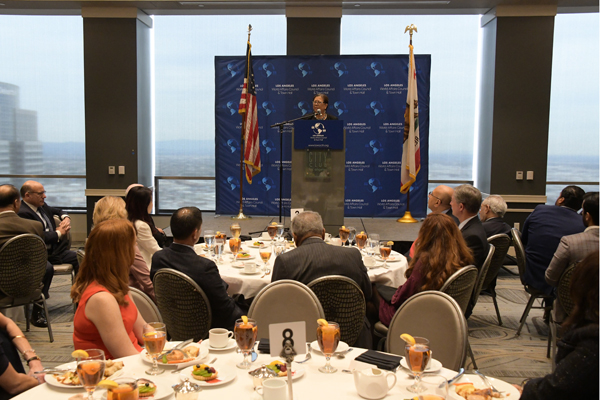
California State Controller Betty Yee addressing the Los Angeles World Affairs Council & Town Hall
Betty Yee controls the fifth largest economy in the world. Elected as California State Controller in 2014, and again in 2018, Yee manages nearly $3 trillion per year. On February 27th, Controller Yee addressed the Los Angeles World Affairs Council & Town Hall (LAWACTH) to discuss both the challenges and opportunities of California’s economic future.
Emily Wang, Director of Marketing and Community Development at East West Bank and LAWACTH board member introduced Controller Yee. Wang paid homage to Yee’s upbringing. She is the daughter of Chinese immigrants who moved to the United States and re-rooted themselves in Chinatown, San Francisco. Raised by two people who believed in hard work and sacrifice, Controller Betty Yee became only the 10th woman in history elected to California state office. Wang noted this fact is both inspiring and unfortunate.
Yee began her address by alluding to the state’s central economic contradiction: while California is a true economic powerhouse, California holds one of the highest child poverty rates in the United States. California’s economy poses a complex conundrum: How can a state with such a large economy face some of the largest economic injustices? Whether it is child poverty, homelessness, or family’s struggling to make ends meet — while the state’s economy further dominates on the global stage every year, it’s residents increasingly face grimmer circumstances every day.
This tension between California’s unparalleled economic force and the glaring inequality within the state was one that Yee did not shy from. Yee stated that her philosophy as Chief Financial Officer of California is:
“The economic health of California rests on the economic health of each and every Californian.”
Yee argued many of these problems stem from a tax structure she labels as “outdated and unfair.” Beyond questions of fairness, Yee raises caution with the extreme dependence on the personal income tax. 67% of California’s revenue fund is derived from this source, which is a volatile tax -- this, an economic downturn would become catastrophic because of such volatility.
Controller Yee touched on the pressing issue of homelessness and how it reflects one of her greatest frustrations with government. To build affordable housing at the rate California needs, government would need to be nimble, coordinated, and streamlined. This is not what developers find when seeking to build affordable units. Creating government structures that are nimble and coordinated is what Yee believes will help solve this crisis and others, such as a future recession.
Despite its struggles, California has unique opportunities for both continued economic growth and greater economic justice. Yee points to the future of work and the future of our climate as two areas that could be “great disruptors or great opportunities.” If the state can harness its wealth and technology, it has the potential to create a new social
Contract of workers and a more sustainable economy.
Yee concluded this point by focusing on where California should look to: human capital. Human capital is the hallmark of California’s economy—it’s what the world has looked to for guidance and leadership—and it is the state’s greatest strength looking to the future.
By Claire Krelitz
